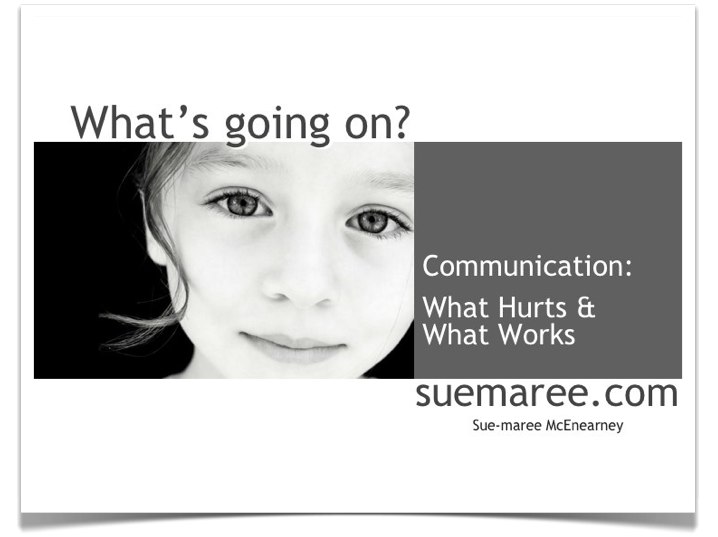The Language of Competition - What We Say
 Sunday, April 18, 2010 at 12:27PM
Sunday, April 18, 2010 at 12:27PM The language of competition plays out when people take hierarchy positions of;
- dominance - to get what they want at the expense of others, and
- submission - to give up what they want in favor of others, and at their own expense.
Specific language patterns that reflect and reinforce domination and submission include;
- I? Asking ‘I’ Questions
- I! Making ‘I’ Statements
- U! Making ‘U’ Statements
I? - Asking 'I' Questions
Asking ‘I’ Questions - is dominating when it;
- Patronizes & condescends to others:
“So I’m going to ........... , am I?”
Asking ‘I’ Questions - is submissive when it;
- Seeks approval/validation from others - inviting them to judge us/our ‘performance’:
“Did I do good?”
“Do I look good?”
“Do I meet your standards?”
“Do I get your approval?”
- Seeks permission to act from others - giving them control over what we get to do:
“Can I ...?”
“May I ...?”
(“Please, pleeeeease?!”)
WE? - Asking ‘WE’ Questions
These same principles apply to the collective in the form of ‘WE’ Questions;
Asking ‘WE' Questions - is dominating when it;
- Patronizes & condescends to others:
“So we’re going to ........... , are we?”
Asking ‘WE’ Questions - is submissive when it;
- Seeks approval/validation from others - inviting them to judge us/our ‘performance’:
“Did we do good?”
“Do we look good?”
“Do we meet your standards?”
“Do we get your approval?”
- Seeks permission to act from others - giving them control over what we get to do:
“Can we ...?”
“May we ...?”
(“Please, pleeeeease?!”)
I! - Making 'I' Statements
Making ‘I’ Statements - is dominating when it;
- Forces the speakers view to the exclusion of others views - without discussion, understanding & agreement:
“I want this!”
“What I say goes!”
“The decision’s made!”
(I made it!)
- Manipulates - for example, with guilt - without discussion, understanding & agreement:
“After all I’ve done for you!”
Making ‘I’ Statements - is submissive when it;
- Relinquishes the speakers view in favor of others views - without discussion, understanding & agreement:
“It doesn’t matter what I want!”
(when it does!)
“I’m happy to do whatever you want!”
(when we’re not!)
WE! - Making ‘WE’ Statements
These same principles apply to the collective in the form of ‘WE’ Statements;
Making ‘WE’ Statements - is dominating when it;
- Forces the group view to the exclusion of others views - without discussion, understanding & agreement:
“Well we want this!”
“What we say goes!”
“The decision's made!”
(We made it!)
- Manipulates - for example, with guilt - without discussion, understanding & agreement:
“After all we’ve done for you!”
Making ‘WE’ Statements - is submissive when it;
- Relinquishes the group view in favor of others views - without discussion, understanding & agreement:
“It doesn’t matter what we want!”
(when it does!)
“We’re happy to do whatever you want!”
(when we’re not!)
U! - Making 'U' Statements
Making ‘U’ Statements - is dominating when it;
- Dictates to others what to do - without discussion, understanding & agreement:
“You’re doing this!”
“You should be doing this!”
“You’re going to do it like this!”
“You need to do this!”
(Do it my way whether you like it or not!)
- Judges and labels others - without discussion, understanding & agreement:
“You’re useless!”
“You’re fabulous!”
“This is what you are!”
(I’m judging what you are!)
Making ‘U’ Statements - is submissive when it;
- Relinquishes the speakers view in favor of others views - without discussion, understanding & agreement:
“Whatever you say!”
“You know best!”
(Do they? How do you know?)
WE! - Making ‘WE’ Statements
Again, these same principles apply in relation to ‘WE’ Statements;
Making ‘WE’ Statements - is dominating when it;
- Dictates to others what to do - without discussion, understanding & agreement:
“We’re doing this!”
“We should be doing this!”
“We’re doing it like this!”
“We need to do this!”
(I’ve decided we need to do it my way!)
- Judges and labels others - without discussion, understanding & agreement:
“We’re useless!”
“We’re fabulous!”
“This is what we are!”
(I’m judging what we are!)
Making ‘WE’ Statements - is submissive when it;
- Relinquishes the group view in favor of others views - without discussion, understanding & agreement:
“We’ll do it your way!”
“We’ll do whatever you want!”
“We’ll defer to you!”
“We trust you to know better than us!”
(Do they? How can we be sure?)
eek?!
Next... Competition Culture >>
Back to... Article List


